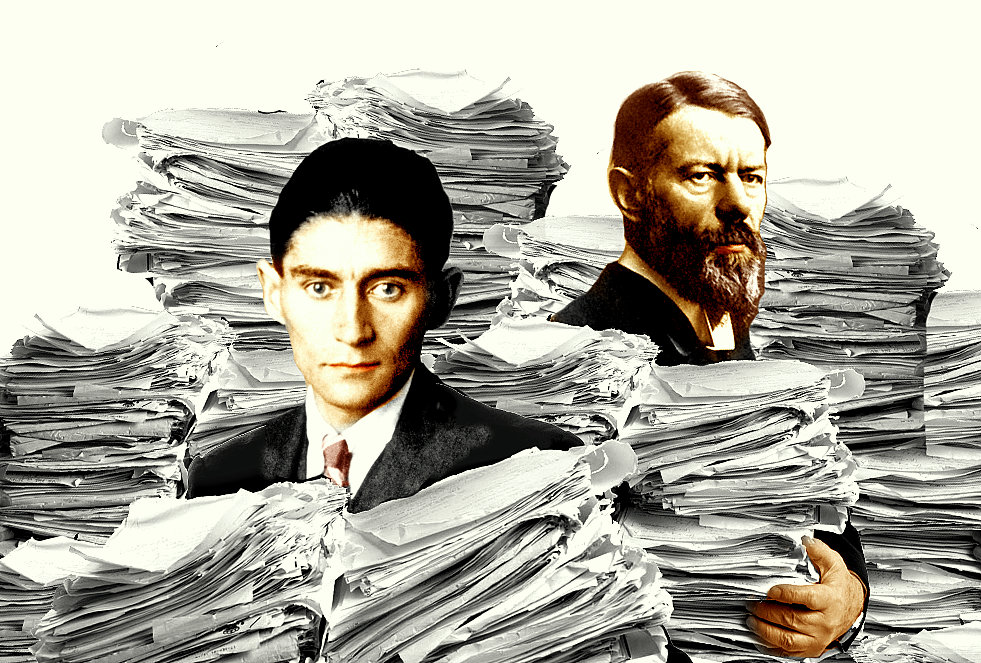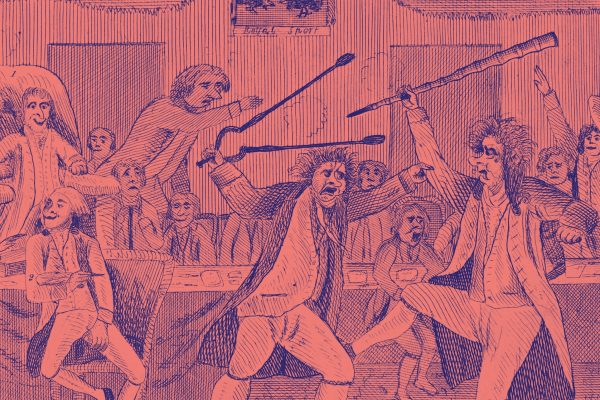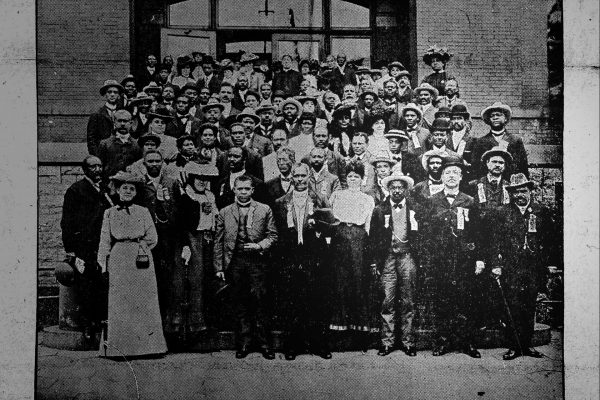It was my second week volunteering at a publicly funded antipoverty agency, and the waiting room was in the only state I had ever witnessed it: crowded. People were here to apply for a range of public programs, including food stamps, fuel assistance, health services, and Head Start. Some had sunk into their chairs with a look of resignation. Others seemed more anxious, holding on nervously to folders or plastic bags filled to the brim with paperwork.
The heavy silence was ruptured by the voice of the receptionist, DeShawn, who alternated between addressing clients—“Please take a seat and fill out this form, someone will be with you shortly, ma’am”—and answering the phone, which never stopped ringing.
Following Trump’s election, bureaucracy had a strange reversal of fortunes. It went from being a thorn in the side of democracy to being its saving grace.
I was training to become a receptionist, and DeShawn was introducing me to the trade.
An elderly woman, visibly exasperated, walked up to the desk and told us that it was her third visit in as many days. She explained that she met with a case manager the day before and was instructed to come back with additional documents. Her eyes were tired and her voice plaintive.
DeShawn leaned forward at first, as if to create an intimate space in the midst of the crowded room, but then reclined away in his swivel chair—mindful, as he later told me, not to appear too approachable to others.
He took turns apologizing—“I am terribly sorry”—and reminding the client that there were rules to which he had to adhere—“I am not authorized to take your documents myself; you must schedule another appointment with the staff member you saw yesterday.”
I witnessed a similar balancing act on my way to the water cooler, where I overheard a young mother inquire about the services that her disabled daughter might be entitled to. The caseworker nodded and risked a smile, encouraging the mother to open up and divulge more information, but then quickly bounced back to neutral efficiency mode as soon as the relevant facts had surfaced, perhaps thinking of those still stranded in the waiting room.
As the day went on, with clients succeeding one another and demands piling up, this balancing exercise continued too, becoming ever more intricate and artful. Between solicitude and professional distance, empathy and rule-following, attentiveness and speed, the line to walk as a frontline bureaucrat was rather thin.
And yet for all this, it is not a compliment to be called a bureaucrat. The word evokes rigidity, insensitivity, coldness, lack of initiative, and, above all, rule-worship. These attributes are so ingrained in our collective imaginary that they have become definitional. According to the New Oxford Dictionary of English, a bureaucrat is not just “an official in a government department” but, more specifically, “one perceived as being concerned with procedural correctness at the expense of people’s needs.”
When I first took up the job, I thought I knew what I was getting myself into. I was conducting ethnographic research for what would become my book, When the State Meets the Street: Public Service and Moral Agency (2017), and I had chosen the agency because, as a nonprofit contracted by the state, it was emblematic of the new face of public service provision. In preparation I had read every novel on bureaucracy I could lay my hands on, from works by Franz Kafka to David Foster Wallace, and I had come mentally prepared for the soul-sucking tedium of standard operating procedures.
But fiction, so suggestive in describing bureaucracy from the outside, turned out to be a rather poor guide to bureaucracy from within. Instead of precise rules dictating my every move, I found myself having to contend with a range of demands that were both vague and competing, with little practical guidance on how to do so.
From Franz Kafka to David Foster Wallace, bureaucratic fiction turned out to be a rather poor guide to bureaucracy from within.
So what does good bureaucracy look like? If you think about any public good—infrastructure, defense, the environment, the market—chances are there lurks in the background a bureaucratic agency charged with drafting regulations, monitoring compliance, and enforcing penalties. Bureaucracy is often thought of as the instrument that we deploy in the service of the public good. But can we also speak of bureaucracy as a public good in its own right? What is its proper role in the everyday functioning of a democratic state, and how can we enable bureaucrats to live up to such a role?
These questions are especially relevant and primed for attention now, at a time when people have lost trust in their government and its policies. Ever since the election of Donald Trump to the presidency of the United States, bureaucracy has had a strange reversal of fortunes. It has gone from being a thorn in the side of democracy to being its saving grace. In the space of a few days following his inauguration, the media was awash with stories detailing how bureaucracy could stand up to government and serve as a bulwark against populism.
The very attributes of bureaucracy that had earned it condemnation from across the political spectrum—its alleged inertia and inefficiency, questionable claims to expertise, and lack of responsiveness to political control—had now become virtues. For some this was just a marriage of convenience: bureaucracy was as detestable as ever, but nevertheless preferable to the alternative now within sight. If poor implementation had wrecked good policies, it might now save us from bad ones.
But for others this shift entailed a newfound appreciation for bureaucracy: perhaps there was a sensible rationale behind red tape, technocracy, and an independent-minded administrative apparatus. A culture of bureaucratic autonomy, after all, is not something that can be activated at the press of a button. If we want bureaucracy to be committed to a mission independent of the ebbs and flows of politics, we must be ready to accept it even when the political pendulum swings our way. But how should we define such a mission? And how can we best see it achieved?
We are often tempted to think of bureaucracy as a tool that can be utilized by successive governments to achieve policy objectives. This vision presupposes a strict division of labor: elected representatives select policies, bureaucrats execute them. The former is a morally charged task, which involves weighing competing values and interests; the latter is a technical matter, which involves enacting directives faithfully and efficiently.
However attractive this picture of bureaucracy may seem, it is a wildly inaccurate account of how bureaucracies actually function. The text of the law is often ambiguous and riddled with conflicts. It lends itself to various interpretations, and can be “operationalized” in a variety of ways. Resolving such indeterminacies is not merely a technical challenge, but one that requires bureaucrats to prioritize certain values and interests over others. Moral and political decision-making continue well within bureaucratic agencies, as the meaning of the law is clarified and given practical countenance.
In addition to being indeterminate, it is important to recognize that policy statutes are also frequently incomplete. They generally specify what bureaucracies should do, without spelling out in great detail how they should do it. With respect to public policy, we must be concerned not just with what policies the state should pursue, but also with how the state ought to interact with those who are subject to its authority when enacting such policies. The first question is settled by and large in legislative chambers; the second is resolved in bureaucratic agencies.
Bureaucrats do not merely execute. They are frontline workers who must grapple independently with complex questions.
Consider any policy selected through proper democratic procedures. Regardless of its content, its implementation will have to respond to a further set of normative demands. At the very minimum, we would want the policy to be enacted in a way that is efficient, fair, responsive to the needs of individual citizens, and respectful of them. How to interpret these various demands, how to apply them to specific cases, and how to resolve conflicts that arise between them are normative challenges that are intrinsic to the implementation process.
At the antipoverty agency, for example, my colleagues and I were constantly reminded by our direct supervisor that we catered to vulnerable clients who spent their days being kicked around from one administrative office to another. It was incumbent upon us, by contrast, to create a warm and welcoming environment, in which they were treated courteously and felt respected as individuals. The directives we received from the agency’s headquarters, however, said nothing about warmth or dignity. They emphasized the importance of retaining professional distance and serving clients on the basis of clear rules and standards applied impartially. Our performance was also evaluated by the number of cases we processed.
These values—efficiency, fairness, responsiveness, and respect—are at the heart of our democratic political culture, but it falls to bureaucrats to find sensible compromises between them and to make sure that none systematically overshadow the rest. In this balancing act, bureaucracies perform a crucial public service. This is a service, moreover, that is independent from the policy goals they are instructed to pursue by the government of the day. Bureaucracy functions not merely as an instrument in the pursuit of specified policy goals, but as a crucible in which our abstract values are given practical meaning and the tensions between them worked out. It is in this sense that we can speak of bureaucracy as a public good, not just as an instrument for the public good.
It is worth looking at the bureaucratic demands of efficiency, fairness, responsiveness, and respect in greater detail.
The standard of efficiency embodies the ideal of good management. Public administrators are entrusted with a limited amount of public resources, and we, as citizens, expect them to make these resources go as far as possible. This means being economical and speedy in the provision of services, and dispensing them to the greatest possible effect.
We can measure the importance of efficiency, as a standard of evaluation, by the stridency of the criticisms that public administration draws when it fails to live up to it. If public service agencies are perpetually threated with budget cuts and staff reductions it is, in part, because they are widely perceived as slow, wasteful, and ineffective.
On its own, however, the standard of efficiency does not capture what is distinctive about public service agencies. Unlike charities or commercial enterprises, such agencies interact with individuals in their capacity as citizens. They do not merely provide services; they provide services that people are entitled to as a matter of right.
Moreover, in a democracy, citizens are political equals who have a claim to being treated by their state with equal concern and respect. Public administrators, then, have a duty of fairness and impartiality. Here again, the importance of the criterion can be measured by how seriously we take its violation—when officials are accused, for instance, of favoritism, bias, or discrimination.
It falls to bureaucrats to find compromises between democratic values. In this balancing act, bureaucracies perform a crucial public service.
The third normative standard—of responsiveness—captures the thought that no two cases or situations that bureaucrats encounter are exactly alike. If public administration is to be legitimate, it is not enough for it to be impartial and to treat people equally; it must also be attentive to the specificities of their needs, demands, and circumstances. Pierre Rosanvallon has argued that the importance accorded to responsiveness to particularity is a relatively recent transformation within democracy. Democratic citizens, he claims, are no longer willing to accept a one-size-fits-all model of treatment. They expect officials to listen to them and to respond with some flexibility to the specificities of their case. This comes out in a range of familiar criticisms leveled at public service agencies: that they are distant, unconcerned, and immured in red tape.
The requirement of respect, finally, overlaps partially with the previous two without being fully covered by them. To be treated with respect is to be treated according to fair standards and with proper attention to the specificity of one’s case. But as Jonathan Wolff has argued, it is also to be treated in a way that is neither insulting, demeaning, nor infantilizing. Bureaucracies can be insulting when they lack common courtesy toward clients or when they are unduly suspicious of them. They can be demeaning when they require recipients to publicly reveal things about themselves they consider shameful as a condition for getting assistance. They can be infantilizing when they treat clients as if they were not capable of making decisions for themselves.
These four normative demands—efficiency, fairness, responsiveness, and respect—capture value commitments that are central to our democratic political culture. They involve a concern, respectively, for the aggregate well-being of citizens, for their equality, for their individual rights, as well as for their autonomy and dignity. These commitments are irreducibly plural. We may prefer to have them in different mixes, but most of us would agree that all of them should be attended to.
The problem, of course, is that these commitments often point in competing directions. The demands of fairness and responsiveness can clash, especially when resources are scarce. Should bureaucrats exhaust all the options available to a particular client or adopt a standard of treatment they could realistically replicate for all? Efficiency is often measured by the number of cases processed. But what if racking up numbers can be achieved by prioritizing easy cases and dispensing with complicated ones? And what about the many facets of respect? The most expedient way to process clients, after all, is to be curt with them.
This is where the moral, as opposed to the merely technical, challenge of implementation begins. How should we weigh these plural demands and strike sensible compromises between them?
These questions are difficult, in part, because a proper answer to them is highly dependent on context and situation. We can develop broad guidelines for how to handle tradeoffs that recur frequently, but there is a limit to how much we can decide cases ex ante without blindly prejudging them. This is why administrative rules and procedures must often coexist with a substantial amount of discretion, and why this discretion must trickle all the way down to the frontlines of public service provision.
To say that bureaucrats must attend to a plurality of values is not to say that they are always successful in doing so. Any organization would be hard pressed to be efficient, fair, responsive, and respectful at once—let alone one that is chronically understaffed, underfunded, and forced to operate in a hostile political environment.
Bureaucrats often have no choice but to make difficult tradeoffs between different dimensions of value. In such conditions, it is proper to feel conflicted. It would be worrying, in fact, if one did not.
But while moral conflicts of this kind occur occasionally in our ordinary moral life, three features of frontline work in public service make them particularly hard to bear. The first is that bureaucrats experience these value conflicts relentlessly, since the demand for public services never abates. The second is that any half-measures or compromises can have serious consequences for clients. By accelerating the pace of work, for example, a caseworker might not build an intimate enough rapport for a client to open up about sensitive topics such as domestic violence. Conversely, by slowing it down, other clients might be late on receiving a check they desperately need.
Bureaucracy functions not merely as an instrument in the pursuit of policy goals, but as a crucible in which our abstract values are given practical meaning and the tensions between them worked out.
Navigating such conflicts is distressing for bureaucrats because, as a frontline worker, you are personally implicated in the process. As I learned from taking over DeShawn’s role as a receptionist, it is not the “bureaucratic state” that lets a client down, but you. As a street-level bureaucrat, you are the face of the institution—the immediate cause of clients’ despair, frustration, and anger, and the first to witness it.
It is hard not to feel complicit and not to blame yourself. You start wondering whether you might in fact be the one failing clients. However hard and conscientiously you work, you cannot shake off the thought that you might have been able to do more or better. How long can you think of yourself as a competent and dedicated public servant when you are forced to flout that ideal daily? Knowing that the problem is structural in nature is little consolation when you are the one who has to make the tough calls, and when you are seen as such by those who bear the consequences of your choices.
Over time the psychological pressure builds and, if left unchecked, takes its toll. Some are able to put up with it by compartmentalizing and distancing themselves from their actions. Others burn out. A great many, however, respond as social psychologists would have us expect: through cognitive distortions that simplify the moral landscape and thereby reduce the sense of conflict they experience. Since they cannot live up to the demands of the role, they narrow their understanding of these demands so as to be able to live up to them.
Frontline bureaucrats often pick one dimension of the role and dedicate themselves unreservedly to it, to the exclusion of others. Some come to think of themselves as caregivers, devoting themselves to particular clients regardless of the consequences. Others become fixated on upholding program requirements and making sure that no one takes unfair advantage of existing provisions. And others become absorbed in seeing clients as rapidly as possible to maximize the number of those they can assist. Moral specialization along these lines emerges as a coping response to the pressures of everyday work. It reduces the sense of conflict that one experiences, at the cost of a reductive understanding of one’s responsibilities.
Public service agencies thus find themselves in a bind. The proper implementation of public policy depends on their capacity to foster a workforce attuned to a plurality of values. And yet, the nature of everyday work at the frontlines of public service rewards narrow specialization.
There are steps that bureaucracies and bureaucrats can take to better cope with such a predicament.
At the individual level, the bureaucrats who succeed in retaining a balanced approach to the role are those who learn to live with conflict. They come to accept it as an unavoidable part of the job—one that must be managed, controlled, and toned down to a level that is sustainable. They do so, in part, by deploying a range of everyday practices of the self that allow them to mitigate the psychological strain and preempt the cognitive distortions it would otherwise produce.
Management makes a difference, too. Supervisors can counteract the drift toward reductive dispositions by fostering diverse working groups in which peers with different sensibilities keep one another in check. They can design and calibrate a multidimensional system of incentives to remind workers of the relevant considerations.
Getting that balance right is more an art than a science, but the underlying idea is simple: if we want bureaucracy to attend to a plurality of values, such pluralism must itself be reflected within the organization. This is an approach to management that is sensible when we cannot specify in advance what we want bureaucrats to do, but when we know what considerations we want them to be mindful of as they figure it out for themselves.
This stance involves some measure of humility. We want bureaucrats to be respectful and responsive, while recognizing that we cannot spell out precisely what this will entail in a particular context or situation. We also need them to be fair and efficient, while admitting that we cannot elucidate how conflicts between these various desiderata should be handled.
The key to this approach is not just to rely on bureaucrats’ judgment, but to make sure they evolve in a decision-making environment that exposes them to the right cues and influences. This approach (“delegate and inform”) is a departure from both the rule-saturated model of governance that we typically associate with bureaucracy (“command and control”) and from the managerial model that has gradually been replacing it.
Since the 1980s, under the influence of a body of ideas known variously as Reinventing Government or New Public Management, public service agencies have incorporated a vast array of managerial practices drawn from the private sector. Most prominent among these is performance-based evaluation—the idea that the success of bureaucracy should be assessed primarily by the efficiency with which it delivers on its objectives (“set targets and track”).
Focusing on objectives rather than procedures was meant to liberate bureaucrats from the tangle of red tape, boosting their efficiency while providing the public with a more objective standard for accountability. Both aspirations are of course laudable, provided we do not fetishize them. While greater accountability is welcome, setting clear metrics as goals risks displacing or distorting an agency’s overall mission. In such cases, we achieve a pyrrhic victory: securing greater control over the actions of bureaucrats at the cost of impoverishing their mandate.
Lest we succumb to such facile temptations, the directives we provide bureaucrats must remain underdetermined. We cannot content ourselves with assessing performance in terms of efficiency or compliance to standards. Bureaucrats, after all, do not merely execute. They must also grapple independently with complex normative questions. To govern them as if they were mere instruments is the surest way to hollow out their moral promise. If bureaucracy is to stand a chance of being a public good, we must evaluate and manage bureaucrats with that in mind.
Editors’ Note: This essay draws upon the author’s book, When the State Meets the Street: Public Service and Moral Agency.








